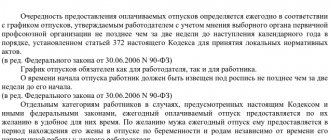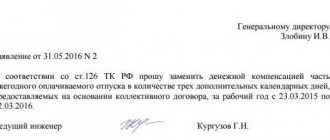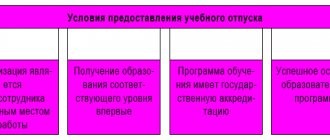Objective reasons for postponing vacation
All possible situations of mandatory transfer of vacation are provided for in legislative documents (Article 124 of the Labor Code). In particular, the transfer of rest days occurs when an employee of the enterprise was unable to fully take advantage of them, because:
- Serious health problems have arisen: the employee has fallen ill or been injured. He sought medical help and received a certificate of incapacity for work.
- Was involved in the performance of government duties. An example of this is participation in a trial as a juror (Article 10, paragraph 3 of Article 11 of the Law of August 20, 2004 No. 113-FZ).
In the following situations, employee leave:
- is postponed after submitting an application in writing;
- is extended. That is, vacation is not transferred to another period, but unused days are simply added at its end. In this case, an employee’s verbal request is considered sufficient. But still, it is better to get a written statement from him.
Example. The labor safety inspector of Virtuoz LLC was on vacation from 09/01/2017 to 09/28/2017. During this period, he suffered from ARVI and received sick leave for 5 days (from 09/18/2017 to 09/22/02017). The inspector appealed to the management of the LLC with a request to extend the vacation until 03.10. 2020. The request was justified by the presented certificate of incapacity for work.
The head of “Virtuoso” wrote a corresponding order.
An employee has the right to demand rescheduling of vacation if:
- he was not informed in a timely manner about the start of his vacation - 2 weeks in advance as provided for by law (Article 123 of the Labor Code);
- the employee did not receive vacation pay on time - no later than three days before the start of the vacation period.
Important! There are other reasons for transfer, if only they are provided for in the Labor Code or specified in local documents.
Erroneous actions when extending the next vacation on the part of the employee and the employer
| Description of the situation | Possible consequences and the right decision |
| The order to extend the period of absence due to illness was issued based on the request of the vacationer, which he stated by phone | This decision is incorrect. The employer must issue an order on the basis of an application submitted by the vacationer specifically to extend, and not postpone, the vacation, as well as in the presence of a supporting document (sick leave). This will eliminate controversial situations. For example, when a vacationer goes to work and does not provide sick leave, because, as it turns out, there is none |
| The employee, while on regular leave from January 2 to January 19, 2018, was ill for 5 days. His last day of rest falls on Friday (01/19/2018). Without notifying the employer, the vacationer independently extends the vacation period from January 22, 2018 by 5 days of sick leave. | The situation under consideration from the point of view of the law is interpreted as follows: 1. The employee unlawfully increased the vacation period. He should have made a written request to the employer for an extension and presented documentary evidence of the reason - a sick leave certificate. 2. The vacation period must be extended from the day immediately following the end of the vacation or period of temporary disability (from January 20, 2018). 3. If there is at least 1 day of break between the final day of rest (or day of incapacity for work) and the beginning of the part of the vacation associated with illness, we are talking about postponing the vacation period, and not about extending it. |
Features of transferring vacation days
To reschedule a vacation, an employee writes an application addressed to the head of the enterprise. The document states:
- scheduled date;
- the reason for the transfer;
- days to which it is desirable to transfer rest days.
The application must be accompanied by a document justifying the request (if available).
When an employee requests a transfer of leave for personal reasons, he should also contact his supervisor in writing.
Documents for rescheduled vacation
Important! An employer has the right to refuse an employee if there are no objective reasons for rescheduling leave.
In what cases is an extension possible?
According to the labor legislation of the Russian Federation, annual paid leave must be extended or postponed in the following cases:
- employee illness;
- performance by the worker of state duties during his statutory rest period;
- in other cases provided for by law and local regulations.
In the first case, rest during illness can be extended only under one condition: the worker himself must be disabled.
If during his vacation he cared for a sick relative (even if it is a family member), then the vacation period does not increase. If you get sick while on vacation, you must notify management, after which an appropriate order is issued. Sick leave is paid separately from vacation pay , exactly the same as if the illness occurred during everyday work.
This is important to know: Cash compensation for unused vacation for military personnel (military)
As for the performance of public duties, these include:
- sending an employee to military training;
- carrying out activities as part of the election commission;
- participation in a court hearing as a juror.
This list of state duties is open; it can be supplemented with any other duties if the legislation provides for exemption from work when fulfilling them. In addition, the employer, at its discretion, can expand the list of cases of increasing the vacation period by establishing additional situations.
Leave is transferred at the initiative of the employer
There are often cases when a situation arises at work that precludes an employee from going on vacation. The absence of an employee will cause significant damage to the activity of the enterprise if he wants to take advantage of the scheduled rest days.
The head of the enterprise, on his own initiative, due to production needs, can postpone the employee’s vacation. But in order not to break the law, the employer must meet two conditions:
| Necessary Requirements | Decor |
| The employee must agree to the transfer | On the corresponding order, the employee must write about his consent, indicate the dates, and sign |
| The employee is given the opportunity to use vacation in the next year | A note about this is written as a separate paragraph in the order. Rescheduled days are marked in the schedule |
Important! Unused rest days are provided to the employee no later than the following year.
Employer's refusal to extend vacation
Previously, it was said that in almost most cases an employee can have their vacation extended. But there are cases when an employer, not without reason, can refuse to accept an employee.
The most obvious reasons are:
- Refusal or failure by the employee to provide a document providing the basis for guaranteeing an extension of leave.
- No valid reason.
- The presence of a reason that directly or indirectly compromises both the employee and the organization.
- Other cases prescribed by law.
REFERENCE. In cases not provided for by law, the employer is not obliged to satisfy the employee’s request for an extension. After all, he cannot provide additional days without reason. This is also worth paying attention to when submitting your application.
Step-by-step instructions for transferring vacation
Transferring vacation is a procedure consisting of several stages (steps):
| Steps | Description |
| 1. | The employee writes a statement. If there is a document substantiating the request for transfer, provide its original or copy |
| 2. | An order or instruction is issued that the vacation (or part of it) is postponed to the specified dates |
| 3. | The order (instruction) is registered in the order that is in effect at the enterprise. For example, the columns in the Journal of registration of orders (instructions) for personnel are filled out |
| 4. | The employee reads the order. He puts his signature on it. The same is done by persons who are responsible for the correct execution of vacation documents. |
| 5. | The time of postponed vacation is reflected in the timesheet |
| 6. | Vacation schedule is being adjusted |
The schedule is issued annually. The final date for its readiness has been set - 2 weeks before the start of the next calendar year (
What threatens an employer who breaks the law?
For violating the legislation on vacations, the employer faces administrative punishment. There is no separate article in the Code of Administrative Offenses of the Russian Federation for this case, therefore penalties are imposed for violation of labor legislation in accordance with Article 5.27, parts 1 (in case of initial detection of a violation) and 2 (in case of repeated violation).
According to them, the following monetary fines are imposed on the employer:
- For the responsible (official) person within the limits of 1000 - 5000 rubles for a primary violation, and 10,000 - 20,000 rubles for a repeated violation. In especially serious cases, if a repeated violation occurs, an official may be disqualified for 1-3 years.
- Individual entrepreneurs will pay 1,000–5,000 rubles for the first violation and 10,000–20,000 rubles for the second violation. Disqualification cannot be applied to them.
- The company will pay 30,000 - 50,000 rubles for the first violation and 50,000 - 70,000 rubles for the second and subsequent ones.
Note! If the inspection reveals several cases of non-provision of leave, then the inspectors can classify this as several violations and issue an order for each of them. But there is judicial practice that cancels such decisions and qualifies identical violations in relation to several employees as one (as an example, we can cite the Ruling of the Court of the Yamalo-Nenets Autonomous Okrug dated 03.03.2016 No. 4A-305/2015).
The employer's liability for failure to provide leave occurs when he denies the employee rest during the period specified in the vacation schedule, or during any period if the employee belongs to a category that is entitled to this in other cases. The punishment for this is determined by Article 5.27 of the Code of Administrative Offenses of the Russian Federation.
A few questions and answers. Typical mistakes when transferring annual leave
Question 1. Can an employer transfer annual paid leave to another period without obtaining the consent of a subordinate?
Answer. It is unlawful to postpone vacation without the employee’s consent. Therefore the answer is negative.
Question 2. The employer refuses to provide leave to an employee who returns to work after maternity leave. He insists on moving it. Is this legal?
Answer. Employees who go on or return from labor and employment leave are granted annual leave without fail before going on maternity leave or immediately after it ends. Simply submitting an application is enough. The manager will break the law if he insists on rescheduling the vacation.
Violations that often arise when rescheduling a vacation include:
- The employee was not notified that he would be granted leave on days other than those provided for in the schedule. There are often cases when employers ignore the provisions of the Labor Code and present the employee with a fait accompli rather than warning him 2 weeks in advance.
- There are no notes in the vacation schedule about rescheduling the vacation, although this actually happened.
- The documents for its transfer have not been completed.
The most common mistake is the lack of written consent from the employee to postpone the vacation (
What to do if an employee does not want to go on vacation
There are often situations when the employee himself does not want to rest and refuses to go on vacation. As we have already found out, such hard work is fraught with fines for the company. What should I do?
First, make sure that you have a vacation schedule and that the stubborn person is familiar with it. The schedule is mandatory not only for the employer, but also for all employees. And if a worker refuses to go on vacation in accordance with the schedule, this is a violation of labor discipline, punishable in accordance with local regulations and legislation of the Russian Federation (Article 192 of the Labor Code of the Russian Federation). The employer has the right to give the employee at least a reprimand.
But in which case a violator can be fired, read the material “Labor Discipline and Responsibility for Its Violation.”
An employee’s unauthorized departure from work during the period of leave must be recorded in order to eliminate future disputes about payment. This can be done by a human resources employee or an accountant. In order to stop all discussions, you can completely order the company’s security service or the employee’s immediate supervisor not to allow the worker to enter the workplace during vacation days.
ATTENTION! You can send an employee on vacation only with his consent - this is the fact of familiarization with a receipt with the vacation schedule or the manager’s order to send the employee on vacation.
Some employers, trying to get out of a situation where an employee wants to continue working without violating the Labor Code, arrange a vacation period for weekends. That is, the employee divides his annual paid leave into several parts, one of which, by law, cannot be less than 14 days (Article 125 of the Labor Code of the Russian Federation), and he takes the remaining parts on weekends.
For example, if an employee works a 5-day shift, then the accountant issues him 2 days of vacation every week - on Saturday and Sunday, until the employee uses all the allotted vacation days. In this way, the employee will exercise the right to leave and will work at the same pace.
The Labor Code of the Russian Federation does not directly prohibit such a scheme. However, inspectors may still consider this practice a violation of the law: weekends and annual paid leave are different types of rest time (Articles 106, 107 of the Labor Code of the Russian Federation). By issuing a day off, even at the request of the employee, the employer reduces the number of days of rest for the subordinate, which leads to an actual increase in working hours and infringement of the employee’s rights (paragraph 6, 12 of Article 21 of the Labor Code of the Russian Federation). The Ministry of Labor draws attention to this, in particular. Therefore, we recommend that you practice this method of providing vacation: give the employee vacation days on weekends, taking 2 adjacent days - Friday and Monday (with a five-day work week).
The employee may ask you to replace the vacation period with a cash payment. This is also prohibited by law - compensation in lieu of vacation is allowed only for days over 28 calendar days of the annual vacation period. An employee can receive money instead of vacation only upon dismissal - in the form of compensation for unused vacation (Article 127 of the Labor Code of the Russian Federation).
Question to the expert
A company employee was given 10 days of leave due to production needs. His working year is from 06/20/2016 to 06/19/2017. What is the deadline for using vacation?
Answer: Taking into account the dates of the working year, 10 days. The employee must be granted leave until June 19, 2018.
HR inspector Koptev L.P.
Rescheduling vacations is a routine part of many businesses.
If this process is formalized correctly, then conflict situations that may arise on both sides - the employer or the employee - will be eliminated. Rate the quality of the article. Your opinion is important to us:
Step-by-step action plan
So, let's figure out what manipulations need to be done in order to extend the vacation.
Step 1. Employee application
Everything starts with him. It is drawn up by hand, or using a stencil form provided in a particular institution. The application must be accompanied by a document serving as the basis for extending the vacation. Therefore, if there is a reason, then the reason must also be previously indicated.
The list of mandatory details for any application (and renewal is no exception) includes:
- the addressee (usually the head of the enterprise);
- name of the document type;
- date, registration number;
- document text;
- signature;
- approval visas (if provided for by the organization's LNA).
The most difficult thing, as usual, is the text of the document. Below is a sample application for extension of leave (the basis for extension is temporary disability):
Thus, as you can see from the picture, if you get sick while on vacation, the vacation is extended. More details about extending and postponing leave due to illness are described here.
Step 2. Issuing an order
You can skip this step, as this will not be a violation of labor laws. Issuing an order is an optional action , which, however, meets the set goals and objectives.
The set of details for an order to extend leave is inherent in all personnel orders. Worth highlighting:
- name of the institution;
- name of the document type;
- date, registration number, place of preparation (publication) of the document;
- title of the text, the text itself;
- signature, visa approval.
A sample order to extend leave is as follows:
Step 3. Registration of the order in a special accounting book
This step is not followed by every institution, and the absence of a special record can lead to serious consequences. Therefore, we warn you in advance that the extension of vacation must be recorded in a special accounting book ( journal form is welcome ).
Step 4. Read the order
Not only the employee himself (who, after the manager’s signature, must make a note about familiarization with the order ) is subject to familiarization, but also other persons who were directly involved in the preparation of documentation.
Step 5. Recording the extension in the time sheet
Another important step, which is most often put aside by management and is a gross offense. Now, let's figure out whether vacation is extended for holidays?
Step 6. Marking the vacation schedule for extension
Many have at least once asked the question: “If holidays fall on vacation, is the vacation extended?” or “Is the vacation extended if it falls on holidays?”, we hasten to disappoint you, despite the seemingly different wording of the questions, the essence does not change.
Leave is not extended if non-working holidays occur during the period of its provision. This is due to the fact that, according to Article 120 of the Labor Code of the Russian Federation, they are not included in the number of calendar days.
Thus, there is no need to find an answer to the question: “How is vacation extended on holidays?”











